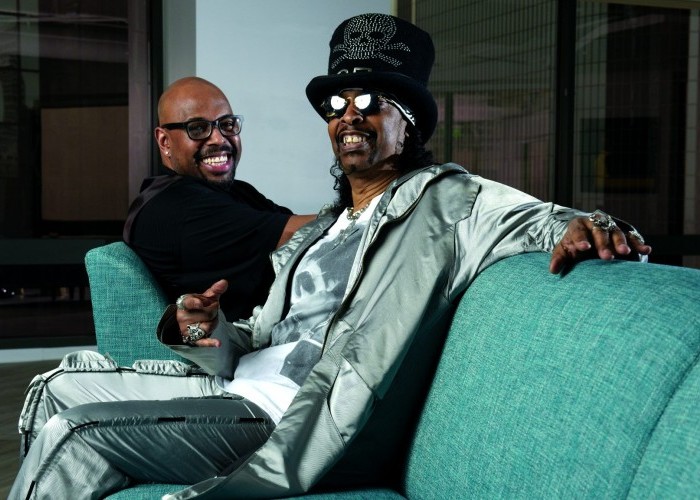Jan 13, 2026 2:09 PM
More Trump-Kennedy Center Cancellations
The fallout from the renaming of the John F. Kennedy Center for the Performing Arts to include President Donald…

Bassist Christian McBride (left) and Bootsy Collins sat down for a moderated conversation with journalist Andy Hermann in Los Angeles.
(Photo: Paul Wellman)“Greatest day of my life,” declared Christian McBride without a hint of hyperbole. Even for a six-time Grammy-winner who’s shared stages and studios with dozens of jazz, pop and r&b luminaries, few experiences can top his first meeting with one of his childhood heroes: Funk legend Bootsy Collins.
Among bassists, there are few figures more revered than Collins, who during his brief stint with James Brown in 1969 and 1970 played on several of the Godfather of Soul’s most iconic singles, including “Sex Machine,” “Soul Power” and “Super Bad.” From there he became part of George Clinton’s Parliament-Funkadelic collective, where he continued to create some of funk’s most indelible bass lines. He also perfected the persona he’s still famous for today: a fun-loving, bespectacled, psychedelic spaceman, playing a star-shaped bass and preaching the gospel of funk in a distinctively laid-back speaking style as syncopated as his bass lines.
Both as a solo artist and with his group Bootsy’s New Rubber Band, Collins remains active, collaborating with numerous artists across a variety of genres. His most recent album, last year’s World Wide Funk (Mastcot), features guest appearances by Stanley Clarke, Victor Wooten, Musiq Soulchild, former Zap Mama bassist Manou Gallo and hip-hop icon Chuck D, of Public Enemy, who all slide seamlessly into the syrupy, multi-layered grooves of Collins’ music.
McBride—one of the most accomplished jazz bassists on the scene today—is no stranger to funk, having explored the genre on a variety of projects, most notably the Philadelphia Experiment, his 2001 collaboration with key- boardist Uri Caine and Roots drummer Ahmir “Questlove” Thompson. He also has the distinction of having been the bandleader and bassist for James Brown’s final performance at the Hollywood Bowl in 2006, just a few months before the singer’s death.
For much of 2018, McBride’s focus will be New Jawn, his quartet with Josh Evans (trumpet), Marcus Strickland (tenor saxophone, bass clarinet) and Nasheet Waits (drums). The group’s album, Christian McBride’s New Jawn, is slated for an Oct. 26 release on Mack Avenue. The program features adventurous original compositions by all four members. McBride also continues to host NPR’s Jazz Night in America and serves as artistic director of the Newport Jazz Festival.
Collins, meanwhile, is working on a Broadway show and writing a memoir tentatively titled Funky Tales From The Crib!
Despite having a long list of mutual collaborators besides Brown, McBride and Collins had never crossed paths before coming together for their DownBeat interview and photo shoot on a rainy Saturday afternoon in Los Angeles. Within minutes, though, they were laughing and joking like old friends, swapping stories about the tempestuous Godfather of Soul and comparing notes about instruments, techniques and influences.
Collins spoke about cutting his teeth in the jazz clubs of his native Cincinnati, often alongside his brother and fellow future Brown sideman, Phelps “Catfish” Collins (1943–2010). The tracks they recorded with Brown made a lasting impression on the Juilliard-trained McBride, especially when he later learned that his father, Philly soul bassist Lee Smith, had once shared a stage with Brown and Bootsy.
Below are edited excerpts from the conversation.
Bootsy, you’ve worked with a lot of jazz players, but have you played a lot of jazz yourself?
Bootsy Collins: Well, I grew up around a lot of jazz players. They were inspiring to me, and brought me in as one of the little young cats. Probably the reason I didn’t go that direction was because James Brown called us off the street. ... And as soon as we got out of there, we went straight to George Clinton. So I didn’t get a chance to learn all the jazz stuff and music theory.
Were you self-taught?
Collins: Oh, yeah. I had no training at all, man. None. It was all for the funk of it. Whatever I heard in my head, that’s what came out.
Christian McBride: Do you remember a guitar player named Kenny Poole? Did you play with him in Cincinnati?

Belá Fleck during an interview with Fredrika Whitfield on CNN.
Jan 13, 2026 2:09 PM
The fallout from the renaming of the John F. Kennedy Center for the Performing Arts to include President Donald…

Peplowski first came to prominence in legacy swing bands, including the final iteration of the Benny Goodman Orchestra, before beginning a solo career in the late 1980s.
Feb 3, 2026 12:10 AM
Ken Peplowski, a clarinetist and tenor saxophonist who straddled the worlds of traditional and modern jazz, died Feb. 2…

The success of Oregon’s first album, 1971’s Music Of Another Present Era, allowed Towner to establish a solo career.
Jan 19, 2026 5:02 PM
Ralph Towner, a guitarist and composer who blended multiple genres, including jazz — and throughout them all remained…

Rico’s Anti-Microbial Instrument Swab
Jan 19, 2026 2:48 PM
With this year’s NAMM Show right around the corner, we can look forward to plenty of new and innovative instruments…

Richie Beirach was particularly renowned for his approach to chromatic harmony, which he used to improvise reharmonizations of originals and standards.
Jan 27, 2026 11:19 AM
Richie Beirach, a pianist and composer who channeled a knowledge of modern classical music into his jazz practice,…